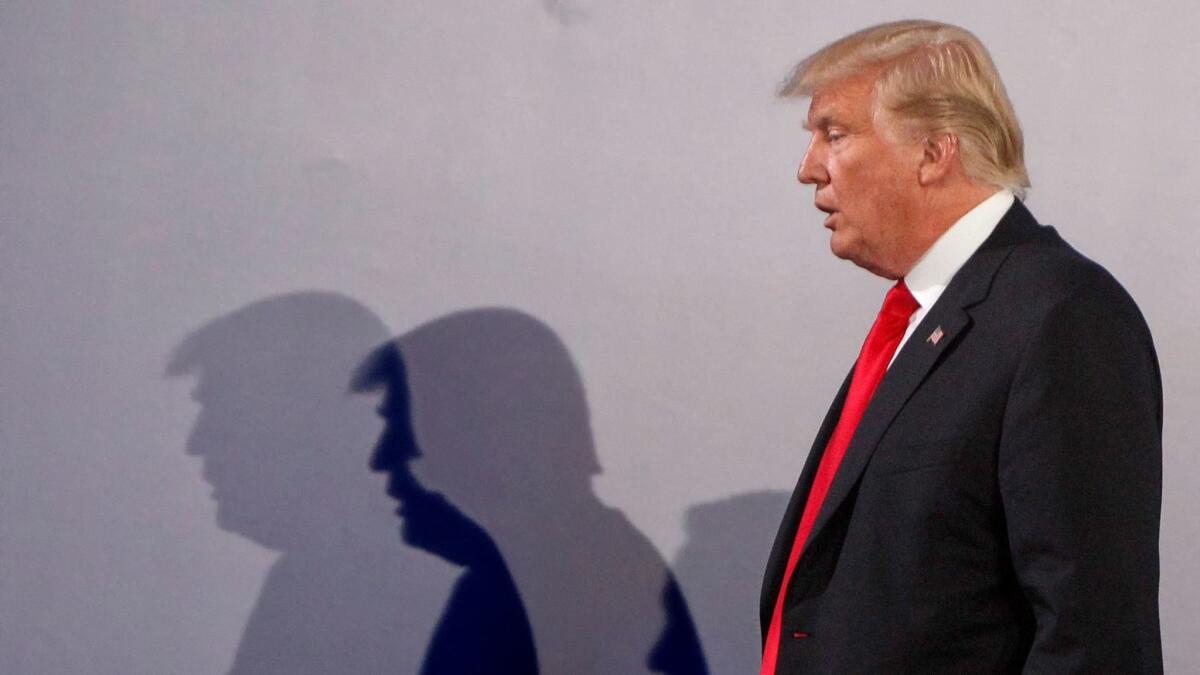Q&A: Could Trump pardon himself? No president ever has, and legal opinions are mixed

- Share via
It's not rare for presidents to dole out pardons. They’ve pardoned friends and felons, political donors and even a former president.
But can a president pardon himself? Well, we’ve now reached that question, six months into
As a special counsel’s investigation into possible collusion between
But could this happen? Here are some answers:
First, what is a presidential pardon?
The U.S. Constitution grants a president the power to pardon anyone of a federal crime. An individual, courts have ruled, does not have to be charged or convicted to receive a presidential pardon.
The president’s pardon power, however, does not extend to state-level crimes. Article II, Section 2, of the Constitution, is far from detailed, but also notes another exception to the president’s power, noting the chief executive can “grant reprieves and pardons for offenses against the United States, except in cases of impeachment.”
So can Trump pardon himself?
No president has attempted to give himself a pardon, and the views among constitutional law experts are mixed.
“The language of the Constitution embraces the idea that there is one person who grants a pardon and a different person who accepts that pardon,” said Jessica A. Levinson, a professor at Loyola Law School, Los Angeles. “There is also a principle of so-called natural law, which provides that no person should stand as her or his own judge.”
Even so, Jonathan Turley, a professor at George Washington University Law School, said a “textual reading of Article II would support a president asserting the right to pardon himself.”
Turley added: “There is nothing in the text and little in the historical record to contradict that assertion of power. There are good-faith arguments on the other side, however, that the natural reading of the power excludes such self-dealing.”
Turley said, however, that a president pardoning himself would raise serious questions “of an abuse of power.”
“It is also important to keep in mind that such a pardon would not protect against either an impeachment or state charges,” he said. “It would also not stop the investigation.”
The language of the Constitution embraces the idea that there is one person who grants a pardon and a different person who accepts that pardon.
— Jessica A. Levinson, professor at Loyola Law School, Los Angeles
What have the courts and federal government said about the issue?
There is no court precedent, because no president has sought to pardon himself. In theory, a president could test the matter.
In the Ex Parte Garland case of 1866, the Supreme Court ruled that the president has full power to pardon anyone, either before, during or after prosecution.
During the height of the Watergate scandal in the 1970s, the Department of Justice provided legal guidance to President Nixon. In a memo, the agency’s Office of Legal Counsel said that “under the fundamental rule that no one may be a judge in his own case, the president cannot pardon himself.”
But this assessment was not binding and, of course, law experts say, could be challenged in the courts.
Have pardons been controversial?
Yes. And that’s putting it mildly.
In 1973, the House Judiciary Committee launched the impeachment process against Nixon for his involvement in Watergate. He resigned in August 1974 before a vote by Congress on his impeachment.
A month later, President Ford, who replaced Nixon, granted the former president a full unconditional pardon for any crimes he “has committed or may have committed or taken part in” during his tenure in office. Democrats and Republicans alike castigated the move as a “corrupt bargain” of sorts.
Nearly two decades later, President George H.W. Bush, in 1992, pardoned six members of former President Reagan’s administration for their roles in the Iran-Contra affair, in which officials secretly made illegal arms sales to Iran to support the Contras fighting the Sandinista government of Nicaragua.
And in January 2001, on his last day in office, President
Who could Trump look to pardon other than himself?
There are several figures — family, friends, political advisors — close to Trump who are believed to be targets of special counsel
Among them: Donald Trump Jr., the president’s oldest son, and
This month it was revealed that both Trump Jr. and Kushner, along with then-campaign Chairman Paul Manafort, visited with a Russian lawyer in June 2016. The lawyer, who has close ties to the Russian government, offered to provide compromising information on Hillary Clinton, Trump’s Democratic opponent, on behalf of the Kremlin, according to emails released by Trump Jr.
In February, Trump’s national security advisor, Michael Flynn, resigned after administration officials said he had misled them about his contacts with Russians officials.
None of these individuals has been indicted. Even so, all, including Trump, are under investigation by Mueller’s team.
There is no timeline for when Mueller’s investigation will be complete or any indication whether charges will be filed against anyone.
Is accepting a pardon an admission of guilt?
Some say yes.
“In my view, I think the president can pardon [him-] or herself, but should expect to get impeached and removed from office for doing so,” said Susan Low Bloch, professor of constitutional law at
She added: “It's likely that the only way we will get a definitive answer is if a president pardons [him-] or herself and then, after leaving office, gets indicted by federal officials. Then the former president would challenge the indictment in court, and the court would rule on the validity of the pardon. Until then, we will all just keep debating the question.”
ALSO
Spicer resigns amid White House shake-up of press and legal teams
Trump's war with his Justice Department: Just his latest with major institutions and alliances
Trump’s lawyers looking for conflicts of interest among Mueller’s investigators
Sign up for Essential California
The most important California stories and recommendations in your inbox every morning.
You may occasionally receive promotional content from the Los Angeles Times.








